- Home
- E. M. Forster
Works of E M Forster Page 7
Works of E M Forster Read online
Page 7
“It will make a difference in the money, surely,” said he.
“No, dear; very little. Poor Charles provided for every kind of contingency in his will. The money will come to you and Harriet, as Irma’s guardians.”
“Good. Does the Italian get anything?”
“He will get all hers. But you know what that is.”
“Good. So those are our tactics — to tell no one about the baby, not even Miss Abbott.”
“Most certainly this is the proper course,” said Mrs. Herriton, preferring “course” to “tactics” for Harriet’s sake. “And why ever should we tell Caroline?”
“She was so mixed up in the affair.”
“Poor silly creature. The less she hears about it the better she will be pleased. I have come to be very sorry for Caroline. She, if any one, has suffered and been penitent. She burst into tears when I told her a little, only a little, of that terrible letter. I never saw such genuine remorse. We must forgive her and forget. Let the dead bury their dead. We will not trouble her with them.”
Philip saw that his mother was scarcely logical. But there was no advantage in saying so. “Here beginneth the New Life, then. Do you remember, mother, that was what we said when we saw Lilia off?”
“Yes, dear; but now it is really a New Life, because we are all at accord. Then you were still infatuated with Italy. It may be full of beautiful pictures and churches, but we cannot judge a country by anything but its men.”
“That is quite true,” he said sadly. And as the tactics were now settled, he went out and took an aimless and solitary walk.
By the time he came back two important things had happened. Irma had been told of her mother’s death, and Miss Abbott, who had called for a subscription, had been told also.
Irma had wept loudly, had asked a few sensible questions and a good many silly ones, and had been content with evasive answers. Fortunately the school prize-giving was at hand, and that, together with the prospect of new black clothes, kept her from meditating on the fact that Lilia, who had been absent so long, would now be absent for ever.
“As for Caroline,” said Mrs. Herriton, “I was almost frightened. She broke down utterly. She cried even when she left the house. I comforted her as best I could, and I kissed her. It is something that the breach between her and ourselves is now entirely healed.”
“Did she ask no questions — as to the nature of Lilia’s death, I mean?”
“She did. But she has a mind of extraordinary delicacy. She saw that I was reticent, and she did not press me. You see, Philip, I can say to you what I could not say before Harriet. Her ideas are so crude. Really we do not want it known in Sawston that there is a baby. All peace and comfort would be lost if people came inquiring after it.”
His mother knew how to manage him. He agreed enthusiastically. And a few days later, when he chanced to travel up to London with Miss Abbott, he had all the time the pleasant thrill of one who is better informed. Their last journey together had been from Monteriano back across Europe. It had been a ghastly journey, and Philip, from the force of association, rather expected something ghastly now.
He was surprised. Miss Abbott, between Sawston and Charing Cross, revealed qualities which he had never guessed her to possess. Without being exactly original, she did show a commendable intelligence, and though at times she was gauche and even uncourtly, he felt that here was a person whom it might be well to cultivate.
At first she annoyed him. They were talking, of course, about Lilia, when she broke the thread of vague commiseration and said abruptly, “It is all so strange as well as so tragic. And what I did was as strange as anything.”
It was the first reference she had ever made to her contemptible behaviour. “Never mind,” he said. “It’s all over now. Let the dead bury their dead. It’s fallen out of our lives.”
“But that’s why I can talk about it and tell you everything I have always wanted to. You thought me stupid and sentimental and wicked and mad, but you never really knew how much I was to blame.”
“Indeed I never think about it now,” said Philip gently. He knew that her nature was in the main generous and upright: it was unnecessary for her to reveal her thoughts.
“The first evening we got to Monteriano,” she persisted, “Lilia went out for a walk alone, saw that Italian in a picturesque position on a wall, and fell in love. He was shabbily dressed, and she did not even know he was the son of a dentist. I must tell you I was used to this sort of thing. Once or twice before I had had to send people about their business.”
“Yes; we counted on you,” said Philip, with sudden sharpness. After all, if she would reveal her thoughts, she must take the consequences.
“I know you did,” she retorted with equal sharpness. “Lilia saw him several times again, and I knew I ought to interfere. I called her to my bedroom one night. She was very frightened, for she knew what it was about and how severe I could be. ‘Do you love this man?’ I asked. ‘Yes or no?’ She said ‘Yes.’ And I said, ‘Why don’t you marry him if you think you’ll be happy?’”
“Really — really,” exploded Philip, as exasperated as if the thing had happened yesterday. “You knew Lilia all your life. Apart from everything else — as if she could choose what could make her happy!”
“Had you ever let her choose?” she flashed out. “I’m afraid that’s rude,” she added, trying to calm herself.
“Let us rather say unhappily expressed,” said Philip, who always adopted a dry satirical manner when he was puzzled.
“I want to finish. Next morning I found Signor Carella and said the same to him. He — well, he was willing. That’s all.”
“And the telegram?” He looked scornfully out of the window.
Hitherto her voice had been hard, possibly in self-accusation, possibly in defiance. Now it became unmistakably sad. “Ah, the telegram! That was wrong. Lilia there was more cowardly than I was. We should have told the truth. It lost me my nerve, at all events. I came to the station meaning to tell you everything then. But we had started with a lie, and I got frightened. And at the end, when you left, I got frightened again and came with you.”
“Did you really mean to stop?”
“For a time, at all events.”
“Would that have suited a newly married pair?”
“It would have suited them. Lilia needed me. And as for him — I can’t help feeling I might have got influence over him.”
“I am ignorant of these matters,” said Philip; “but I should have thought that would have increased the difficulty of the situation.”
The crisp remark was wasted on her. She looked hopelessly at the raw over-built country, and said, “Well, I have explained.”
“But pardon me, Miss Abbott; of most of your conduct you have given a description rather than an explanation.”
He had fairly caught her, and expected that she would gape and collapse. To his surprise she answered with some spirit, “An explanation may bore you, Mr. Herriton: it drags in other topics.”
“Oh, never mind.”
“I hated Sawston, you see.”
He was delighted. “So did and do I. That’s splendid. Go on.”
“I hated the idleness, the stupidity, the respectability, the petty unselfishness.”
“Petty selfishness,” he corrected. Sawston psychology had long been his specialty.
“Petty unselfishness,” she repeated. “I had got an idea that every one here spent their lives in making little sacrifices for objects they didn’t care for, to please people they didn’t love; that they never learnt to be sincere — and, what’s as bad, never learnt how to enjoy themselves. That’s what I thought — what I thought at Monteriano.”
“Why, Miss Abbott,” he cried, “you should have told me this before! Think it still! I agree with lots of it. Magnificent!”
“Now Lilia,” she went on, “though there were things about her I didn’t like, had somehow kept the power of enjoying herself with sincerity. And G
ino, I thought, was splendid, and young, and strong not only in body, and sincere as the day. If they wanted to marry, why shouldn’t they do so? Why shouldn’t she break with the deadening life where she had got into a groove, and would go on in it, getting more and more — worse than unhappy — apathetic till she died? Of course I was wrong. She only changed one groove for another — a worse groove. And as for him — well, you know more about him than I do. I can never trust myself to judge characters again. But I still feel he cannot have been quite bad when we first met him. Lilia — that I should dare to say it! — must have been cowardly. He was only a boy — just going to turn into something fine, I thought — and she must have mismanaged him. So that is the one time I have gone against what is proper, and there are the results. You have an explanation now.”
“And much of it has been most interesting, though I don’t understand everything. Did you never think of the disparity of their social position?”
“We were mad — drunk with rebellion. We had no common-sense. As soon as you came, you saw and foresaw everything.”
“Oh, I don’t think that.” He was vaguely displeased at being credited with common-sense. For a moment Miss Abbott had seemed to him more unconventional than himself.
“I hope you see,” she concluded, “why I have troubled you with this long story. Women — I heard you say the other day — are never at ease till they tell their faults out loud. Lilia is dead and her husband gone to the bad — all through me. You see, Mr. Herriton, it makes me specially unhappy; it’s the only time I’ve ever gone into what my father calls ‘real life’ — and look what I’ve made of it! All that winter I seemed to be waking up to beauty and splendour and I don’t know what; and when the spring came, I wanted to fight against the things I hated — mediocrity and dulness and spitefulness and society. I actually hated society for a day or two at Monteriano. I didn’t see that all these things are invincible, and that if we go against them they will break us to pieces. Thank you for listening to so much nonsense.”
“Oh, I quite sympathize with what you say,” said Philip encouragingly; “it isn’t nonsense, and a year or two ago I should have been saying it too. But I feel differently now, and I hope that you also will change. Society is invincible — to a certain degree. But your real life is your own, and nothing can touch it. There is no power on earth that can prevent your criticizing and despising mediocrity — nothing that can stop you retreating into splendour and beauty — into the thoughts and beliefs that make the real life — the real you.”
“I have never had that experience yet. Surely I and my life must be where I live.”
Evidently she had the usual feminine incapacity for grasping philosophy. But she had developed quite a personality, and he must see more of her. “There is another great consolation against invincible mediocrity,” he said— “the meeting a fellow-victim. I hope that this is only the first of many discussions that we shall have together.”
She made a suitable reply. The train reached Charing Cross, and they parted, — he to go to a matinee, she to buy petticoats for the corpulent poor. Her thoughts wandered as she bought them: the gulf between herself and Mr. Herriton, which she had always known to be great, now seemed to her immeasurable.
These events and conversations took place at Christmas-time. The New Life initiated by them lasted some seven months. Then a little incident — a mere little vexatious incident — brought it to its close.
Irma collected picture post-cards, and Mrs. Herriton or Harriet always glanced first at all that came, lest the child should get hold of something vulgar. On this occasion the subject seemed perfectly inoffensive — a lot of ruined factory chimneys — and Harriet was about to hand it to her niece when her eye was caught by the words on the margin. She gave a shriek and flung the card into the grate. Of course no fire was alight in July, and Irma only had to run and pick it out again.
“How dare you!” screamed her aunt. “You wicked girl! Give it here!”
Unfortunately Mrs. Herriton was out of the room. Irma, who was not in awe of Harriet, danced round the table, reading as she did so, “View of the superb city of Monteriano — from your lital brother.”
Stupid Harriet caught her, boxed her ears, and tore the post-card into fragments. Irma howled with pain, and began shouting indignantly, “Who is my little brother? Why have I never heard of him before? Grandmamma! Grandmamma! Who is my little brother? Who is my— “
Mrs. Herriton swept into the room, saying, “Come with me, dear, and I will tell you. Now it is time for you to know.”
Irma returned from the interview sobbing, though, as a matter of fact, she had learnt very little. But that little took hold of her imagination. She had promised secrecy — she knew not why. But what harm in talking of the little brother to those who had heard of him already?
“Aunt Harriet!” she would say. “Uncle Phil! Grandmamma! What do you suppose my little brother is doing now? Has he begun to play? Do Italian babies talk sooner than us, or would he be an English baby born abroad? Oh, I do long to see him, and be the first to teach him the Ten Commandments and the Catechism.”
The last remark always made Harriet look grave.
“Really,” exclaimed Mrs. Herriton, “Irma is getting too tiresome. She forgot poor Lilia soon enough.”
“A living brother is more to her than a dead mother,” said Philip dreamily. “She can knit him socks.”
“I stopped that. She is bringing him in everywhere. It is most vexatious. The other night she asked if she might include him in the people she mentions specially in her prayers.”
“What did you say?”
“Of course I allowed her,” she replied coldly. “She has a right to mention any one she chooses. But I was annoyed with her this morning, and I fear that I showed it.”
“And what happened this morning?”
“She asked if she could pray for her ‘new father’ — for the Italian!”
“Did you let her?”
“I got up without saying anything.”
“You must have felt just as you did when I wanted to pray for the devil.”
“He is the devil,” cried Harriet.
“No, Harriet; he is too vulgar.”
“I will thank you not to scoff against religion!” was Harriet’s retort. “Think of that poor baby. Irma is right to pray for him. What an entrance into life for an English child!”
“My dear sister, I can reassure you. Firstly, the beastly baby is Italian. Secondly, it was promptly christened at Santa Deodata’s, and a powerful combination of saints watch over— “
“Don’t, dear. And, Harriet, don’t be so serious — I mean not so serious when you are with Irma. She will be worse than ever if she thinks we have something to hide.”
Harriet’s conscience could be quite as tiresome as Philip’s unconventionality. Mrs. Herriton soon made it easy for her daughter to go for six weeks to the Tirol. Then she and Philip began to grapple with Irma alone.
Just as they had got things a little quiet the beastly baby sent another picture post-card — a comic one, not particularly proper. Irma received it while they were out, and all the trouble began again.
“I cannot think,” said Mrs. Herriton, “what his motive is in sending them.”
Two years before, Philip would have said that the motive was to give pleasure. Now he, like his mother, tried to think of something sinister and subtle.
“Do you suppose that he guesses the situation — how anxious we are to hush the scandal up?”
“That is quite possible. He knows that Irma will worry us about the baby. Perhaps he hopes that we shall adopt it to quiet her.”
“Hopeful indeed.”
“At the same time he has the chance of corrupting the child’s morals.” She unlocked a drawer, took out the post-card, and regarded it gravely. “He entreats her to send the baby one,” was her next remark.
“She might do it too!”
“I told her not to; but we must watch her c
arefully, without, of course, appearing to be suspicious.”
Philip was getting to enjoy his mother’s diplomacy. He did not think of his own morals and behaviour any more.
“Who’s to watch her at school, though? She may bubble out any moment.”
“We can but trust to our influence,” said Mrs. Herriton.
Irma did bubble out, that very day. She was proof against a single post-card, not against two. A new little brother is a valuable sentimental asset to a school-girl, and her school was then passing through an acute phase of baby-worship. Happy the girl who had her quiver full of them, who kissed them when she left home in the morning, who had the right to extricate them from mail-carts in the interval, who dangled them at tea ere they retired to rest! That one might sing the unwritten song of Miriam, blessed above all school-girls, who was allowed to hide her baby brother in a squashy place, where none but herself could find him!
How could Irma keep silent when pretentious girls spoke of baby cousins and baby visitors — she who had a baby brother, who wrote her post-cards through his dear papa? She had promised not to tell about him — she knew not why — and she told. And one girl told another, and one girl told her mother, and the thing was out.
“Yes, it is all very sad,” Mrs. Herriton kept saying. “My daughter-in-law made a very unhappy marriage, as I dare say you know. I suppose that the child will be educated in Italy. Possibly his grandmother may be doing something, but I have not heard of it. I do not expect that she will have him over. She disapproves of the father. It is altogether a painful business for her.”
She was careful only to scold Irma for disobedience — that eighth deadly sin, so convenient to parents and guardians. Harriet would have plunged into needless explanations and abuse. The child was ashamed, and talked about the baby less. The end of the school year was at hand, and she hoped to get another prize. But she also had put her hand to the wheel.
It was several days before they saw Miss Abbott. Mrs. Herriton had not come across her much since the kiss of reconciliation, nor Philip since the journey to London. She had, indeed, been rather a disappointment to him. Her creditable display of originality had never been repeated: he feared she was slipping back. Now she came about the Cottage Hospital — her life was devoted to dull acts of charity — and though she got money out of him and out of his mother, she still sat tight in her chair, looking graver and more wooden than ever.

 The Celestial Omnibus and Other Stories
The Celestial Omnibus and Other Stories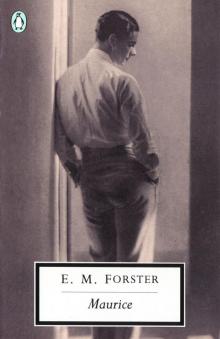 Maurice
Maurice The Longest Journey
The Longest Journey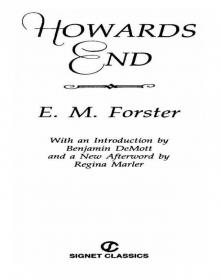 Howards End
Howards End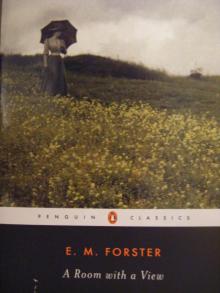 A Room with a View
A Room with a View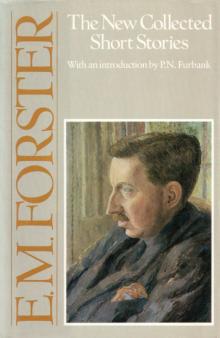 The New Collected Short Stories
The New Collected Short Stories A Passage to India
A Passage to India Where Angels Fear to Tread
Where Angels Fear to Tread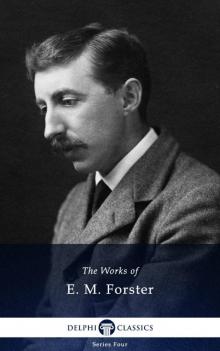 Works of E M Forster
Works of E M Forster Selected Stories
Selected Stories The Machine Stops
The Machine Stops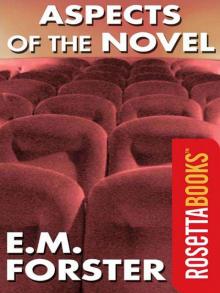 Aspects of the Novel
Aspects of the Novel